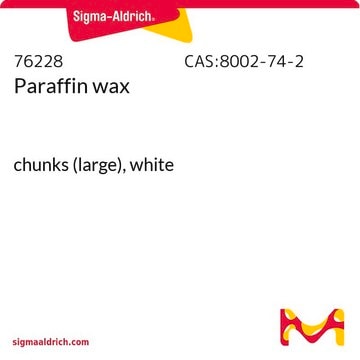327204
Paraffin wax
mp 53-58 °C (ASTM D 87)
Synonym(s):
Paraffin
Sign Into View Organizational & Contract Pricing
All Photos(1)
About This Item
Recommended Products
form
beads
waxy solid
mp
53-58 °C (ASTM D 87)
InChI key
JWHAUXFOSRPERK-UHFFFAOYSA-N
Looking for similar products? Visit Product Comparison Guide
Related Categories
General description
Paraffin Wax is a solidified microcrystal that is produced by continuous boiling of residual oils that include iso-alkanes. It is characterized in terms of soft and hard paraffins with a melting point in the range of 45-60°C.
Application
Paraffin wax can be used as a phase changing material (PCM) that can be loaded with exfoliated graphite nanoplatelets (xGnP) for the development of energy saving building materials. It may be used as a combustion material for hybrid rocket motor applications. Paraffin wax/graphite nanoparticles based nanocomposite may be used in the fabrication of hybrid storage material for solar still to desalinate seawater.
Storage Class Code
13 - Non Combustible Solids
WGK
nwg
Flash Point(F)
602.6 °F - Pensky-Martens closed cup
Flash Point(C)
317 °C - Pensky-Martens closed cup
Personal Protective Equipment
dust mask type N95 (US), Eyeshields, Gloves
Certificates of Analysis (COA)
Search for Certificates of Analysis (COA) by entering the products Lot/Batch Number. Lot and Batch Numbers can be found on a product’s label following the words ‘Lot’ or ‘Batch’.
Already Own This Product?
Find documentation for the products that you have recently purchased in the Document Library.
Customers Also Viewed
Paraffin products: properties, technologies, applications, 14 (1982)
Shuaicheng Guo et al.
Composites. Part B, Engineering, 199 (2020-10-27)
The crack development is considered to be one of the most severe threats to the durability of concrete infrastructure. This study aims to enhance the durability performance of cementitious material with the pH-responsive Superabsorbent Polymer (SAP). The SAP was synthesized
Hybrid carbon nanotube yarn artificial muscle inspired by spider dragline silk.
Chun KY, et al.
Nature Communications, 5 (2014)
<SMALL>Bancroft JD</SMALL>
Theory and Practice of Histotechnology null
Water vapor barrier properties of coated and filled microfibrillated cellulose composite films.
Spence KL, et al.
BioResources, 6(4), 4370-4388 (2011)
Our team of scientists has experience in all areas of research including Life Science, Material Science, Chemical Synthesis, Chromatography, Analytical and many others.
Contact Technical Service










